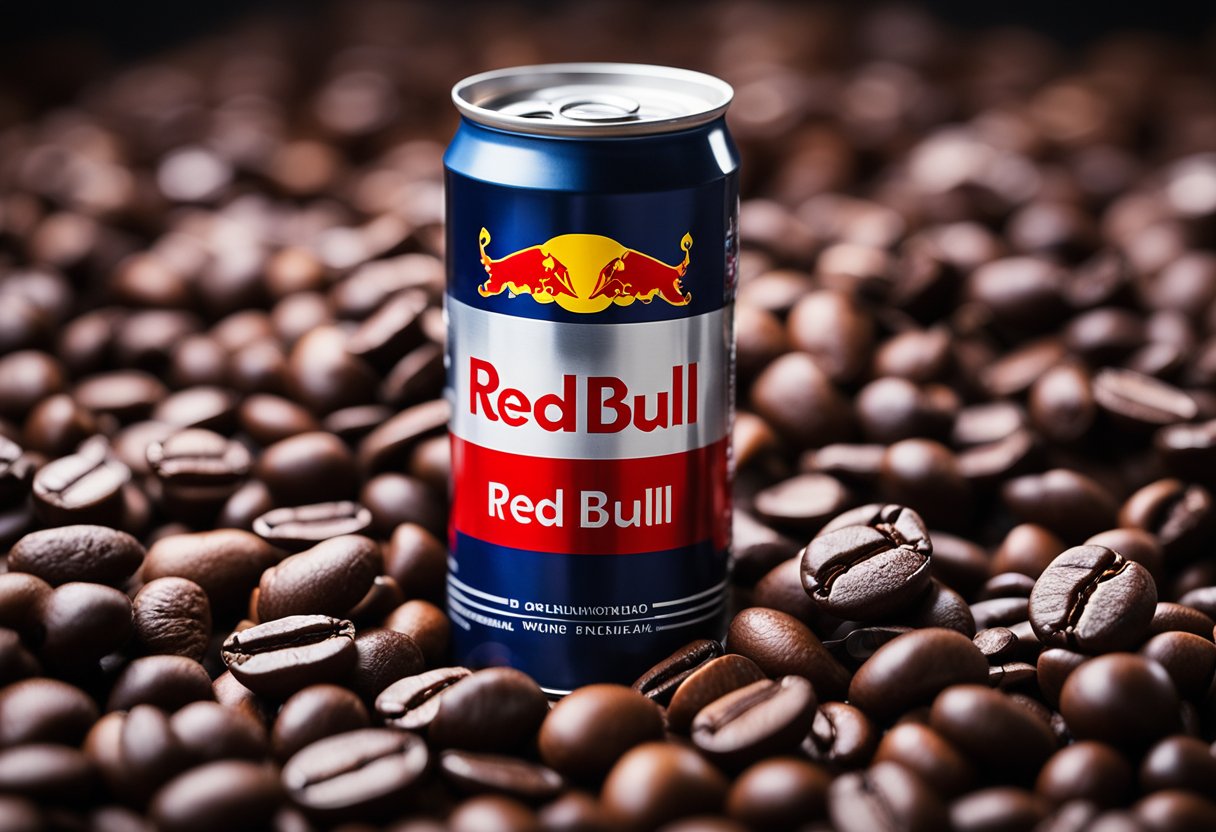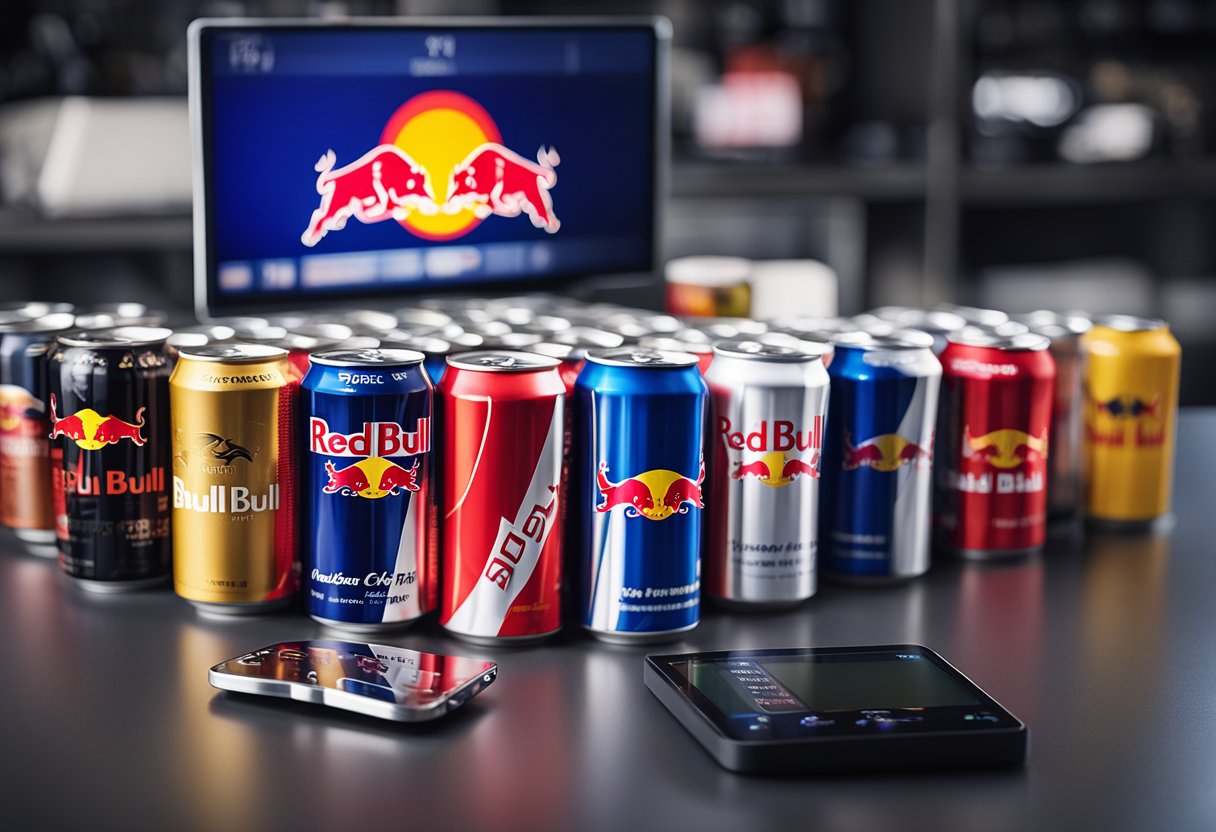How Much Caffeine in Red Bull: Unveiling the Energy Content
Caffeine is a stimulant found in various beverages, and it’s particularly well known for its presence in energy drinks. Among these, Red Bull stands out as a popular choice for those looking to boost their energy levels. Red Bull’s caffeine content is often compared to that of a cup of coffee, which can help consumers understand how much of a kick they might expect from this beverage.

Understanding the caffeine content in a can of Red Bull is important for responsible consumption. Each 250ml can of Red Bull contains 80 mg of caffeine, roughly equivalent to a cup of home-brewed coffee. This amount is considered moderate when compared to other energy drinks on the market, yet it’s sufficient to provide the pick-me-up effect that many seek.
When they choose a can of Red Bull, individuals can also expect to consume other ingredients such as B-group vitamins, sugars, taurine, and water along with caffeine. The energy-providing properties of Red Bull and its components have solidified its reputation as a quick go-to for staying alert, whether it’s during a long drive, an intense study session, or amidst the demands of a hectic workday.
Caffeine Content and Comparison

When considering the caffeine content of various beverages, it is pivotal to compare the levels found in Red Bull to those in other commonly consumed drinks such as coffee and other energy drinks.
Caffeine in Red Bull vs Other Beverages
A standard 8.4 fl oz (approximately 250 ml) can of Red Bull contains 80 mg of caffeine, which is about equivalent to a cup of home-brewed coffee. When compared to other energy drinks, such as Monster or Bang Energy, the caffeine content can vary significantly. For instance, Monster typically holds 160 mg of caffeine per 16 fl oz can, while Bang Energy boasts a much higher caffeine content, providing approximately 300 mg per can.
- Red Bull: 80 mg per 8.4 fl oz
- Home-brewed coffee: 70-140 mg per 8 oz
- Monster: 160 mg per 16 fl oz
- Bang Energy: 300 mg per 16 fl oz
- Starbucks Coffee: Varies depending on the drink, but often exceeds the caffeine content in Red Bull and home-brewed coffee
Factors Influencing Caffeine Effects
The impact of caffeine from any beverage, including Red Bull, is not solely dependent on the milligrams of caffeine it contains. Numerous factors affect how the body processes caffeine, such as an individual’s weight, metabolic rate, and tolerance to caffeine. Additionally, the presence of other substances like sugar and B vitamins might modify the overall effects of the drink on one’s energy levels.
In summary, while the caffeine content in Red Bull is akin to a cup of coffee, the effects may be different due to personal physiological factors and the presence of other compounds within the drink.
Health and Nutrition Profile
In this section, we explore the various components that make up Red Bull’s nutritional content and discuss health considerations associated with its consumption.
Nutritional Components of Red Bull
One 250-ml can of Red Bull Energy Drink provides about 80 mg of caffeine, which is roughly equivalent to that in a cup of coffee. The same serving contains 27 g of sugars, comparable to apple juice, which has approximately 24 g per 8.4 fl oz. Red Bull is also known for containing a unique blend of B-vitamins, including niacin (vitamin B3), pantothenic acid (vitamin B5), vitamin B6, and vitamin B12, which play a role in energy-yielding metabolism.
- Calories: A standard 250-ml can has around 110 calories.
- Protein & Fat: Red Bull contains negligible amounts of protein and fat.
- Amino Acids: It includes taurine, a common amino acid.
- Vitamin Content: Aside from B-vitamins, the energy drink does not typically have fat-soluble vitamins in significant amounts.
- Red Bull Sugarfree options are available with artificial sweeteners like aspartame, sucralose, and acesulfame K, offering a non-caloric alternative.
Health Considerations and Recommendations
The high sugar content of Red Bull is a concern as added sugars can contribute to weight gain and other health issues if consumed in excess. It’s also important to note that the B-vitamins have a specific safety profile and are under the scrutiny of regulatory bodies like the FDA, ensuring levels are within what’s considered safe for the general population.
- Heart Health: Excessive intake may impact heart rate and blood pressure.
- Mental Performance: B-vitamins can help reduce tiredness and fatigue, and caffeine can improve alertness and mental performance.
- Recommended Intake: It’s generally recommended to limit Red Bull consumption, especially if sensitive to caffeine or struggling with sleeping issues like insomnia.
Scientific studies suggest moderation is key to preventing potential side effects related to heart health, while the occasional can could provide an energy boost.
Frequently Asked Questions
In this section, one can find specific information related to the caffeine content in various sizes of Red Bull energy drinks, and how these compare to the caffeine in standard coffee beverages.
What’s the caffeine content in a 500ml can of Red Bull?
A 500ml can of Red Bull contains 160 mg of caffeine, as there is 32 mg of caffeine per 100 ml of Red Bull Energy Drink.
How much caffeine does a 330ml Red Bull contain?
In a 330ml can of Red Bull, there would be approximately 106 mg of caffeine, contingent upon the caffeine ratio of 32 mg per 100 ml.
Could you tell me the caffeine amount in a 473ml Red Bull?
A 473ml can of Red Bull, which is not a standard size sold in all regions, would theoretically contain roughly 151 mg of caffeine, based on the 32 mg per 100 ml caffeine concentration.
What is the difference in caffeine levels between Red Bull and regular coffee?
The caffeine content in Red Bull Energy Drink is comparable to that of an average cup of coffee, with both beverages containing roughly 80 mg of caffeine per 250 ml.
How does the caffeine in a sugar-free Red Bull compare to the original?
Sugar-free Red Bull contains the same caffeine content as the original Red Bull Energy Drink, which is 80 mg of caffeine per 250 ml can.
Is the caffeine in a Red Bull more than what you find in coffee?
Generally, the caffeine level in Red Bull is similar to that of a regular cup of coffee; neither contains significantly more caffeine per comparable serving sizes.
